Sudan Conflict Monitor #17

24 December, 2024
The Sudan Conflict Monitor is a rapid response to the war in Sudan written through a peacebuilding, human rights, and justice lens, reflecting on the most important stories in the country. Please share it widely.
Powered by Ayin, Human Rights Hub, and the Sudan Transparency and Policy Tracker
In this issue:
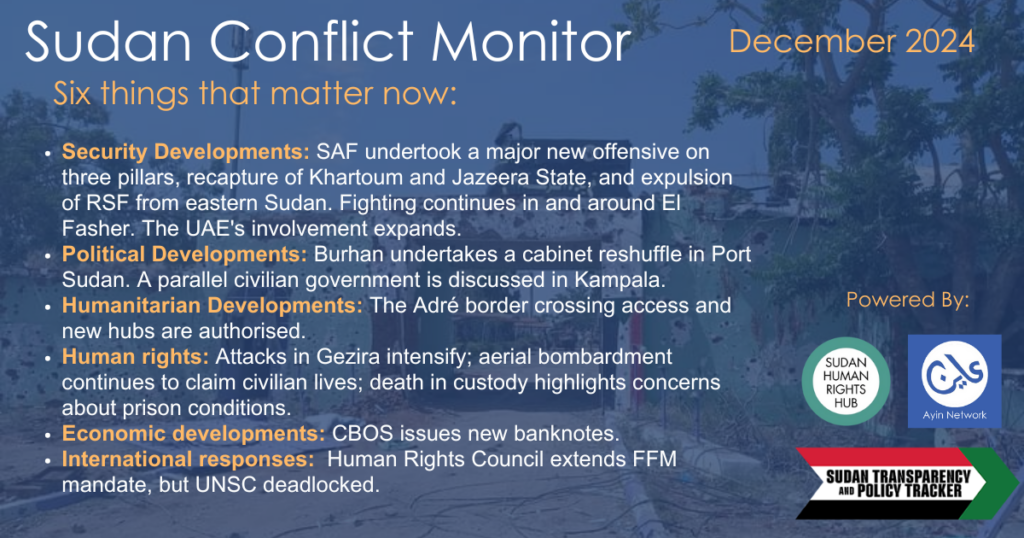
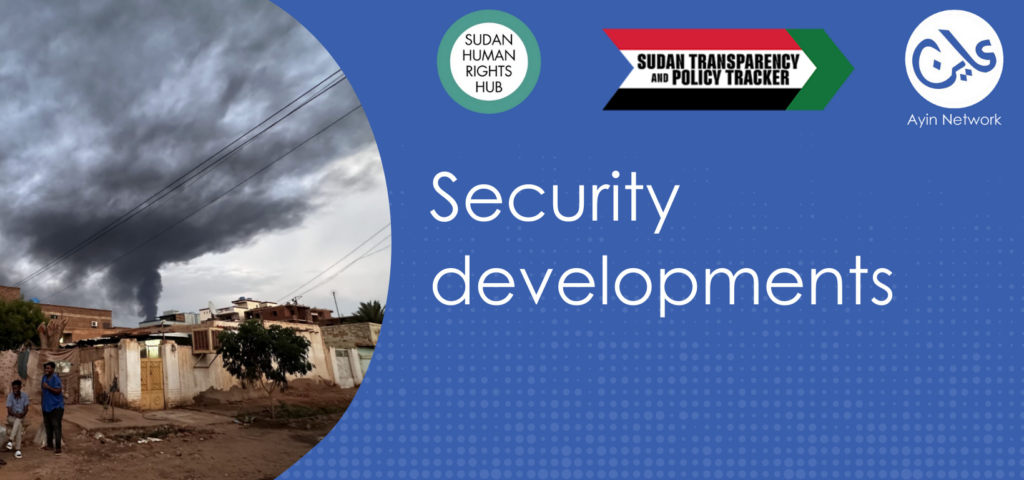 1. Security Developments
1. Security Developments
SAF undertakes a major new offensive
The past two months of ground fighting have largely centred around the ambitions of a major offensive launched by the Sudanese Armed Forces (SAF) and aligned, third-party armed groups in mid-September 2024, which is ongoing. Having allegedly received significant additional external logistics and military support and deployed both newly trained and reserve units, SAF and aligned forces have made a series of advances in central Sudan. SAF appears to be specifically eyeing three strategic objectives:
1.) Re-capture of the Khartoum – Bahri – Omdurman tri-city area. SAF lost large swaths of the capital’s residential and administrative areas to the RSF at the onset of April 2023 fighting, holding only a series of military enclaves such as the General Command HQ, the Shajara Armoured Corps, military camps in Bahri city, Wadi Saeedna airbase, and the Mohandiseen (engineering) corps in Omdurman.
The SAF’s September 2024 offensive marks the largest effort to bring coherence and connectivity to the SAF’s positions in the capital since the SAF captured the National TV and Radio Station in March 2024. The offensive is currently making progress in the al-Mogran area of downtown Khartoum, attempting to expand both southward toward the Shajara Armoured corps, eastward along Nile Street toward the Presidential Palace, and from Bahri bases in al-Kadaro and Hattab in the direction of the Signal Corps in Kober and ultimately to the General Command HQ in downtown Khartoum, and from Omdurman bases in Karari and Mohandiseen southward toward the Salha neighbourhood and westward toward Umbada neighbourhood. Ground sources, however, note that media reports of SAF’s progress are often overstated and rarely align with actual ground positioning—and that RSF has made robust preparations for counterattack in most contested areas of the capital.
2.) Re-capture of Jazeera state and its capital, Wad Madani. The December 2023 loss of Wad Madani and large segments of Jazeera state to the RSF was an embarrassment for the SAF. It unlocked a number of tactical options for onwards RSF offensives and threatened SAF-held White Nile, Sennar, Blue Nile, and Gedaref states. Although SAF attempts to re-take Jazeera were repeatedly announced throughout 2024, SAF sources appear to be more confident this time, generally reasoning that RSF units in Khartoum and Jazeera reinforce each other and are now jointly under pressure, including from SAF drones. Lack of a sustainable re-supply route for RSF units east of the River Nile / White Nile, particularly due to the contestation of the Ad Duwaym bridge, periodic destruction of Jebel Awliya Dam, and the defection of the RSF Jazeera Area Commander Aqila Abu Kikal to SAF, were also cited as increasing the likelihood of SAF progress. Fighting continues along three axes: 1.) From al-Fao, Gedaref, directly toward Madani via the Hantoub bridge; 2.) From Sennar city, Sennar state, northward toward Jazeera via Wad al-Haddad; and 3.) From Kosti-Rabak to a key staging point in Manaqil, then eastward toward Madani. Marginal progress appears to be periodically made along each of these axes, although SAF sources’ October 2024 projection of victory in one month has since been abandoned.
3.) Expulsion of RSF from Eastern Sudanese border regions. On June 29, 2024, the RSF swiftly captured the city of Sinja in Sennar state, seemingly surprising the SAF defenders who had anticipated an intensification of the siege on Sennar city. RSF had then pressed eastward toward al-Dinder, roughly a four-hour drive from the border to Benishangul Gumuz, Ethiopia, via Dinder National Park. At the same time, RSF’s control of Sinja threatened Blue Nile State, which sits on the Sudan-South Sudan-Ethiopia tri-border area. As of November 2024, SAF and aligned forces had repulsed some of RSF’s attacks in this area with the sequential re-capture of 1.) Jebel Moya, Sennar, which sits on the road between Sennar city and Kosti-Rabak and isolates RSF southward units; 2.) Al-Dinder and Sennar, blocking RSF from southern parts of Gedaref State and the Ethiopian border; and 3.) Eventually Sinja City itself. RSF presently remains in other parts of Sennar state, particularly with land access to Upper Nile State, South Sudan, via Al-Dali / Al-Mazmoum locality, Sennar.
Although the recent SAF offensive has made progress, November 2024 through February 2025 marks the peak of Sudan’s dry season and is described by Sudanese military experts as “the best time for RSF to fight.” The season particularly favours RSF’s modus operandi of rapid advances and manoeuvre warfare. Ground sources in Western Sudan note significant RSF mobilisation and recruitment over the past months, including in cross-border regions such as Goz Beida, southeastern Chad, and Northern / Western Bahr el Ghazal, northwestern South Sudan. This is paired with a reported uptick in RSF logistics and weapons re-supply despite unverified public reports of regional disaffection with RSF’s lack of progress on the ground and emerging financial issues. The expected RSF counteroffensive has yet to materialise, likely due to continued coordination issues among RSF’s military hierarchy (several key field commanders have died over the past few months and the RSF Jazeera Area Commander, Aqila Abu Kaikal, defected) and the quagmires in El Fasher and the North Darfur desert. Nonetheless, Sudanese military experts expected RSF to seek control of an expanded stretch of the South Sudan border (e.g., in Heglig, West Kordofan) and the Kordofans (El Obeid and Babanusa remain under siege), lost territory in the Khartoum-Bahri-Omdurman tri-city area, and to consolidate presence in Jazeera while probing for SAF weaknesses in neighbouring White Nile, Sennar, Blue Nile, and Gedaref. Indeed, RSF attacked the Joda border crossing point with South Sudan in White Nile in early December.
Sources in Northern Sudan report elevated fear of RSF raids in the dry season, similar to RSF’s raids south of Shendi, River Nile, in December 2023, and predicated upon RSF’s continued presence in Hajjar al Assal, River Nile state, and a series of long-range drone strikes against air bases and SAF military infrastructure across the cities of northern Sudan.
Fighting continues around El Fasher
Fighting continues in western Sudan; most significantly, RSF continues to besiege El Fasher, North Darfur, and in scattered but numerous engagements against the SAF-aligned Joint Forces (al-Moshterika) and popularly mobilised militias across the North Darfur desert.
Despite persistent alarms of the imminent fall of El Fasher and warnings of the significant humanitarian impact and potential for RSF atrocities, ground sources remain confident in the combined SAF, Joint Forces, and popularly mobilised militias’ defence of the city. While the RSF has periodically made advances over the past few months—particularly in attempting to link its control of the northwest and southeast sectors of the city and cut off fortified positions around either Zamzam (west) or Abu Shok (north) IDP camps from one another—it has suffered heavy casualties and been unable to penetrate the outskirts of the SAF 6th Division HQ due to heavy weapons fire and the SAF’s deployment of landmines.
The RSF has shelled Zamzam camp, which allegedly contains Joint Forces defensive positions, causing thousands to flee and creating further difficulties for aid access in a region that is already identified to be facing famine conditions. However, Joint Force supply lines from other parts of North Darfur to the western sector of El Fasher, specifically to Zamzam camp, remain open, and civilian safe passage arrangements exist both westward toward El Tina, N. Darfur, and southward to Tawila, currently under negotiated control of the non-aligned Sudan Liberation Movement—Abdulwahid faction with participation by other factions of Darfur armed groups.
Although the Joint Forces continue to receive a degree of SAF re-supply via a route from Ad Dabbah, Northern State, to Sudan to Al-Mthalath, on the Libya-Sudan-Chad border, then southward to North Darfur, they have also capitalised on the SAF’s September 2024 offensive and reinforcements / re-supply from allied factions staging in Libya and northeastern Chad to engage in separate action against the RSF in Darfur along three axes, as reported by ground sources:
1.) Joint Forces have massed in Malha, N. Darfur, and fought southward to areas such as Mauw, Meidob, and Jebel Issa toward El Fasher. RSF units in the northern sector of El Fasher, such as Mellit and Um Marahik, have been pulled to contain this push, especially in October 2024.
2) The western three localities of N. Darfur—El Tina, Um Baru, and Kornoy—with emphasis on control of the Libya and Chad border as a vital re-supply route for both sides and logistics bases, particularly for the RSF. The most significant change along this axis has been the Joint Forces’ capture of RSF’s base in Bir Mezza in late September 2024, although it was subsequently re-captured a few weeks later.
3.) The northern localities of West Darfur—particularly around Kulbus and Jebel Moon—where Joint Forces, especially JEM, and some newly recruited and trained fighters from the Masalit community aspire to pressure RSF control of El Geneina. Despite some initial successes by the Joint Forces in Jebel Awm, the RSF appears to have largely neutralised the threat, although tensions continue as of November 2024.
Both parties continue to be able to re-supply. SAF has increased its air force capabilities, with ground sources reporting the upscaling of air bases in Merowe, Atbara, and Shendi, with likely improvements made to Wadi Saeedna and Omdurman as well. Transfers of air assets from neighbouring countries have been alleged, and air strikes—some successfully targeting senior RSF commanders—have increased. Significant numbers of civilian casualties, whether deliberate or indiscriminate, continue to be reported. Long-range and smart drones are increasingly used by RSF in frontline areas in El Fasher and against military targets in the cities of northern Sudan. Some of this technology was transferred via airlift to Nyala, S. Darfur, with the actual number of flights exceeding that publicly reported due to concern for the safety of observers. Some flights have evacuated RSF personnel, both wounded and able-bodied, to an unknown destination. RSF also appears to have improved its artillery assets, including having newly transferred some anti-air and field artillery pieces to Omdurman for purposes of shelling SAF in Wadi Saeedna and surrounding areas.
Expanding engagement by the United Arab Emirates (UAE)
It appears that the UAE is expanding its engagement in Sudan through the provision of third-country fighters. In the past few weeks, reports that Colombian fighters have been recruited to fight alongside the RSF have emerged. Media reports indicate that they were recruited by a UAE company for deployment as security guards in Libya, only to find themselves sent to support the RSF in the siege of and attacks on El Fasher. According to sources, the Columbians were brought to train the RSF on using advanced drones and artillery that the UAE delivered to the RSF in recent months.
The incident highlights the difficulties the RSF is facing, as it had suffered high casualties, lost several prominent field commanders in this battle, and failed for months to overrun the defences of the SAF and allied Joint Forces of the armed movements. It also highlights the limitations of its ethnically based recruitment strategy for sustaining its actions. It also suggests that the UAE continues to support the RSF and would be likely to deal with the RSF as a de facto authority if it declares unified administration of territories under its control as has been anticipated.
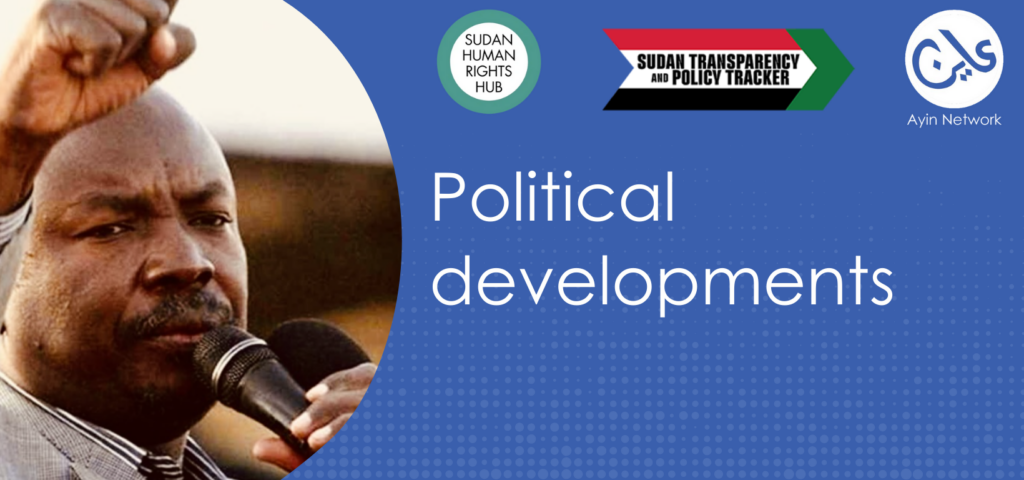 2. Political developments
2. Political developments
Burhan undertakes a cabinet reshuffle in Port Sudan
In early November 2024, Sudan’s military ruler, Lt.-Gen. Abdel Fattah al-Burhan, replaced several ministers in Port Sudan, with Khalid Ali Eleisir, Omer Bakheit, Omar al-Banefeer, and Ali Yousif now respectively named acting ministers of Information, Religious Affairs and Endowments, Trade and Supply, and Foreign Affairs. The foreign minister was the third to occupy this position this year, after Hussein Awad replaced Ali al-Sadig in this position in April 2024, indicating SAF’s challenges in tackling its diplomatic isolation.
The limited reshuffle fell significantly short of Burhan’s August 2024 promise to appoint a full-fledged emergency government to address the country’s escalating crises. Instead, the appointments appeared designed to address immediate political pressures—specifically, fending off inflated demands from the Darfur armed movements allied with the SAF for an increased share in the central government, improving the performance of the ministries of foreign affairs and information, and offering Eastern Sudan better representation in high-level positions, likely to increase support from ethnic militias from the region to balance out the disproportionate influence of the Darfur movements in the war and government. However, these changes offered little hope of enhancing the performance of Port Sudan’s authorities in delivering essential services, such as public health, education, and food.
Meanwhile, SAF’s civilian political allies in the Forces of Freedom and Change—Democratic Bloc voiced dissatisfaction, claiming they were not consulted about the reshuffle. Political commentators viewed the changes as further evidence of Burhan’s centralisation of power within the Transitional Sovereignty Council (TSC). The legitimacy of the TSC itself has been widely questioned since the 2021 coup, which toppled Sudan’s transitional institutions and undermined the prospects of a democratic transition.
Despite the increasing centralisation of power in the hands of the military, key revenue-generating ministries—Finance, Energy, and Mining—remain controlled by armed movements that signed the 2020 Juba Peace Agreement (JPA) and are now military allies of the SAF in the ongoing war against the RSF, particularly in defence of El-Fasher. However, tensions between these groups and the SAF have reportedly escalated. The two largest factions in the Joint Forces—the Justice and Equality Movement (JEM) led by Finance Minister Gibril Ibrahim and the Sudan Liberation Movement faction led by Minni Minawi (SLM-MM)—are said to have pressured Burhan for additional concessions, including high-ranking positions and financial payments in return for their continued military support.
On October 19, journalist Rishan Oshi published details from the minutes of a meeting allegedly held at Gibril Ibrahim’s residence weeks earlier, where Joint Forces leaders discussed pressuring SAF to allocate 50% of transitional government institutions to Darfuri movements. The demands reportedly included control of the Foreign Affairs, Interior, on top of the Finance and Mining ministries they continue to hold, and the positions of Prime Minister and First Vice President of the TSC. Three smaller factions within the Joint Forces—the Gathering of Sudan Liberation Forces, the SLM Transitional Council, and the SLM-Tambour faction—reportedly declined to support these demands.
According to Oshi, a meeting of the movements’ field commanders two months earlier had already presented an ultimatum to the TSC chairman, demanding the delivery of military equipment (including four drones, 1,500 Land Cruiser pickups, and an equal number of Dushka and Goryunov machine guns, RPG launchers, and 300 sniper rifles) or they would withdraw from the conflict. Burhan has reportedly ignored these demands.
When questioned during press events, both Gibril Ibrahim and Minni Minawi did not categorically deny these reports. Instead, they argued that it was natural for Darfuri movements to insist on fully implementing the JPA, which calls for greater Darfuri representation in central government institutions. They also justified the financial payments and equipment requests for their forces by citing the significant wear and tear on their vehicles and resources during their battles alongside the SAF.
Discussions of a Parallel Government
In early December, during a leadership council meeting in Kampala, the civilian Taqaddum coalition discussed internal organisational challenges and strategies to withhold recognition of the de facto authority in Port Sudan. The coalition views this authority as illegitimate, stemming from the October 2021 coup against the constitutionally established transitional government, and holds it responsible for the devastating war between the coup’s two main perpetrators—the SAF and the RSF.
A significant point of debate during the meeting was a proposal by some members—specifically the armed factions within the Sudan Revolutionary Front (SRF), including the Darfurian Sudan Liberation Movement factions led by Tahir Hajar and El-Hadi Idris, the Justice and Equality Movement (JEM) faction led by Suliman Sandal, and the Beja Congress in Opposition led by Ussama Saeed, besides other individuals from politics—to form a government in exile as a way to reinforce their denial of the de facto authority’s legitimacy. However, most of Taqaddum’s constituent bodies did not support this proposal. The leadership council referred the matter to a dispute resolution mechanism for further study to avoid a split within the coalition.
Before the committee could convene, the SRF factions shifted their stance, announcing their intention to establish a government within Sudan rather than in exile. This led to public tensions within the coalition. Taqaddum’s official spokesperson, Bakry Eljack, repeatedly emphasised in several media appearances the coalition’s opposition to forming a government in RSF-controlled areas, arguing that such an action would not only fail to address the concerns of providing services to civilians there but is likely to expand the war and further serve to divide the country. Eljack also reaffirmed Taqaddum’s position of rejecting the legitimacy of both warring factions, the SAF and RSF. He further concluded that the factions that intend to join the government in RSF-controlled areas may be seen as deviating from Taqaddum’s political vision by pursuing their plans independently, necessitating the coalition to develop strategies to manage these practical differences.
Meanwhile, the RSF expressed its willingness to “cooperate” with any government established in areas under its control. In recent weeks, RSF leaders held meetings in Nairobi with several armed and political factions that view an alliance with the RSF as a viable strategy to counter the SAF and the Islamist Movement’s efforts to retain power in Sudan.
Increasing evidence of splits among Islamists
There has been an increasingly public rift among Islamists over recent weeks. Three individuals (Ibrahim Ghandour, Ahmed Haroun, and Ibrahim Mahmoud) are currently vying for the leadership of the National Congress Party. In recent weeks, their disputes have intensified as Haroun and Mahmoud attempt to garner support, while Ghandour remains neutral. At the same time, they have sparked tensions with the broader Sudanese Islamist Movement, which has recently publicly credited recent SAF victories. This tension is more fully explored in a forthcoming briefing paper by the Sudan Transparency and Policy Tracker.
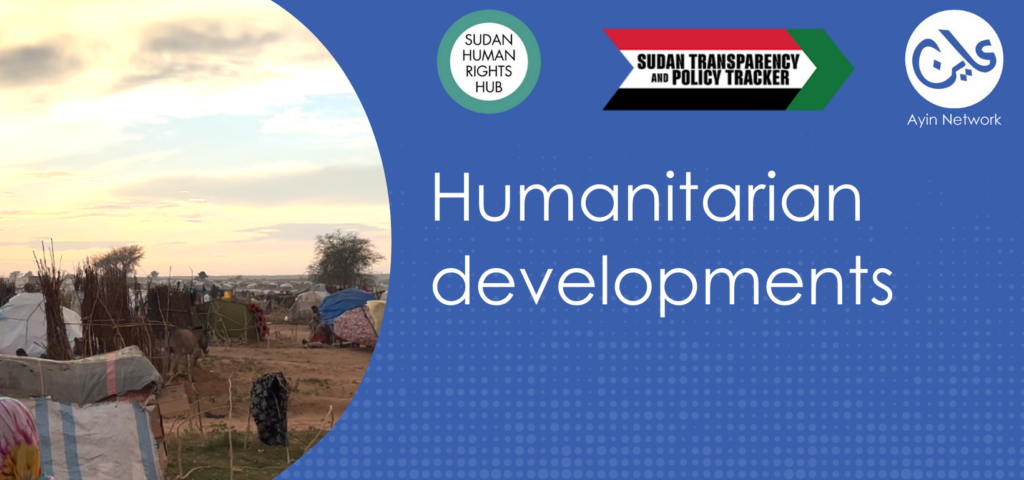
3. Humanitarian developments
Adré crossing access and new hubs approved
In mid-November, the three-month provisional opening of the Adré border crossing was extended for an additional three months, in a move that was welcomed by the UN as a lifeline for the local population. Over the prior three months, 377 trucks crossed the border, supporting an estimated 1.4 million residents. On November 25, General Al-Burhan announced on X that UN agencies would be allowed to use airports in El Obeid, Kadugli, and Ed Damazine. Given that in October the UN estimated that it was able to reach only about 2 million of the estimated 24 million in need, the additional access points are welcome, although the full impact of this decision is unclear given that both parties have been consistently undermining humanitarian access and, for example, El Obeid continues to be besieged and the extent of access is unclear.
 4. Human rights
4. Human rights
Attacks in Jazeera intensify
Since October 20, 2024, RSF has been reported to have intensified attacks in the al-Butana area, in the east of Jazeera state, which contains around 60 villages and the city of Rifa’a, and neighbouring areas such as Tamboul and al-Kamlin. Although the information is limited due to lack of internet connectivity—allegedly a tactic used by both SAF and RSF—secondhand reports from on the ground and among newly displaced show a pattern of RSF targeting of civilians, including through forced displacement, looting, sexual/gender-based violence, and civilian deaths. RSF have targeted the villages of Sarhan, Azraq, Sireiha, al-Hillaliya, and around Rifa’a city. Reports as of November 2024 suggest over 1,200 civilians were killed in one month.
RSF contacts have disputed that number, claiming misinformation is being deliberately shared with the human rights community to rally international opinion against the RSF. Several contacts explain the RSF escalation in al-Butana and Jazeera as retaliation for the defection of RSF Jazeera Area Commander Aqila Abu Kaikal, on October 20th near Tamboul, as well as the declaration of support for SAF by the Nazir of the Shukriya tribe, retired Brig. Gen. Ahmed Abu San, hailing from the al-Butana region. RSF and ground sources both allege that SAF handed out weapons among al-Butana communities to mobilise them against the RSF, which RSF claims makes them armed combatants. SAF sources admitted to the transfer of weapons, arguing that “RSF had attacked first and these weapons were the last option for self-defence.”.
RSF actions in al-Butana and Jazeera have drawn widespread international condemnation, with reports of alleged cases of RSF poisoning inhabitants of al-Hilaliya village in November 2024. While ground and media sources have shared conflicting accounts of how this poisoning may have occurred—from the deliberate transfer of infected cattle or goats to the accidental consumption of fertiliser-treated seeds looted from Jazeera scheme warehouses and sold to local markets—al-Hilaliya residents nevertheless remain encircled by RSF with dwindling supplies due to the siege. Ground sources have additionally reported that safe passage outward from the area is only granted upon payment of a hefty sum of money to RSF escorts.
On December 15, Human Rights Watch released a report chronicling widespread sexual violence against women and girls in South Kordofan. The incidents that were documented included gang rape and sexual slavery.
Aerial bombardments continue to claim civilian lives
Meanwhile, the pattern of bombing of civilian areas by the Sudan Armed Forces (SAF) has continued. In early December, Sudan War Monitor reported on attacks in Kabkabiya, Al-Kuma, and Melit, the cities of Nyala and El Fasher, and the Khartoum suburb of Hai Mayo that collectively claimed an estimated 200 lives. The army responded that it had the “right to deal with any site or facility used by the militia [RSF].”
Death in custody raises concerns about prison conditions
Yasser Ali Mohammed Al-Hassan died in Nyala after being detained for more than a month by the rapid support forces. There is concern that his death was the result of torture. Yasser was arrested as part of a broader crackdown on civilians and former military personnel in the city. Relatives told Ayin that they received Yasser’s body a full day after his death and were not allowed to carry out an autopsy to determine the cause of death.
According to Ayin, sources close to the Rapid Support Forces, South Darfur Sector, estimate that the militia is detaining 330 people in the city, most of whom are former military personnel from the army, police, and security services, in addition to political leaders and civilians from among the merchants and activists. The pattern of arrests is apparently only intensifying as air strikes on the city increase. Some are able to secure release through the payment of bribes.
The incident raises concerns about the treatment of detainees more broadly.
ICC closes its first Sudan trial
On December 11-13, the ICC heard closing arguments in the case of Ali Muhammad Ali Abd-Al-Rahman (aka Ali Kushayb). Kushayb voluntarily surrendered in the Central African Republic and was transferred to the ICC in 2020. He is charged with war crimes and crimes against humanity committed in Darfur in 2003-2004. The trial is an important step towards accountability. As the Executive Director of the International Centre for Transitional Justice Fernando Travesí said, “It is so far the first and only trial holding a leader accountable for serious crimes allegedly committed in Darfur. The Sudanese stakeholders who will attend the closing statements will witness that international justice continues to pursue perpetrators of mass human rights violations regardless of the passage of time.” However, the case is also a reminder of the work left to be done. The ICC’s other suspects in the Sudan case remain at large, and victims remain disappointed with the failure to achieve comprehensive accountability 19 years after the referral of the case to the court in 2005. Indeed, many argue that the failure to deliver justice has contributed to the impunity that allows the ongoing violence in Darfur.
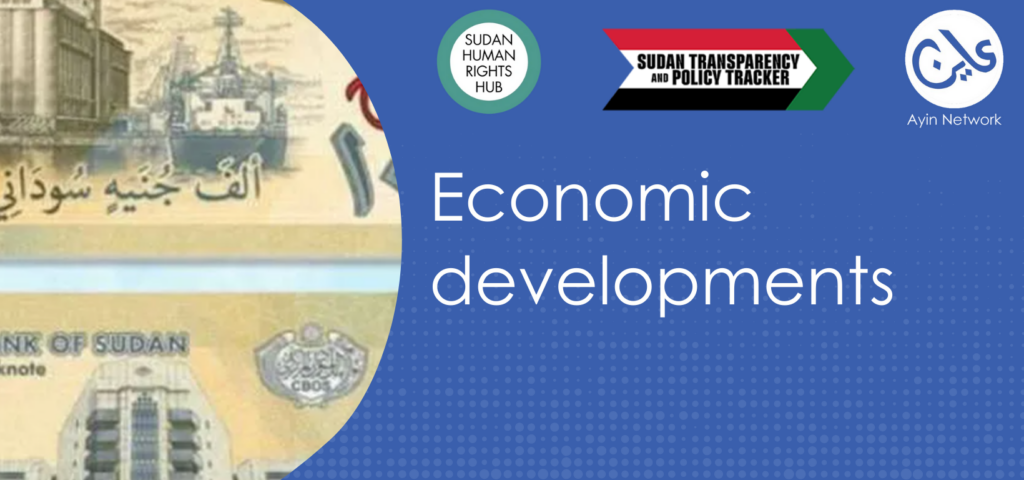
5. Economic developments
CBOS Issues New Banknotes
On November 9, the Central Bank of Sudan (CBOS) announced plans to issue new 1,000 and 500 Sudanese Pound (SDG) banknotes. These new bills will include advanced security features to prevent forgery, a move the CBOS deemed essential due to the Rapid Support Forces’ (RSF) widespread looting of freshly printed cash. During the early phase of the war, the RSF seized control of the currency printing facility in Khartoum and systematically looted deposits and savings from bank branches in areas under its control.
This bold measure by the CBOS comes nearly 18 months after the war’s eruption, during which the RSF freely utilised the stolen currency. Their raid on the Sudan Currency Printing Company yielded significant amounts of high-denomination SDG notes, including partially printed bills, which have since circulated as legal tender in RSF-controlled regions.
The introduction of the new banknotes places the Sudanese pound at the centre of the conflict. The measure appears aimed at pulling currency out of RSF-held areas and into the official banking system in Sudan Armed Forces (SAF)-controlled zones. The exchange of old 1,000 and 500 SDG notes will only be possible in SAF areas, as RSF-controlled regions lack operational banking infrastructure. Furthermore, Sudan’s military leader, Lt.-Gen. Abdel Fattah al-Burhan, recently established a special prosecutorial office and court to scrutinise the origins of banknotes submitted for exchange. Holders of old notes will only receive the new ones via bank deposits, with new accounts opened for individuals without existing ones. These strict measures effectively restrict the currency exchange to SAF-controlled areas.
RSF Rejects Currency Exchange
The RSF has categorically rejected the currency exchange. A spokesperson for its civil administration in East Darfur described the move as an attempt to economically isolate RSF areas and warned it could lead to Sudan’s partition. In response, the RSF called on people in its territories to boycott the exchange. Additionally, RSF officials announced plans to adopt the U.S. dollar and other foreign currencies for commercial transactions, further fuelling economic fragmentation.
RSF Bans Exports to Egypt
In a countermeasure, the RSF issued a decree on October 8, 2024, banning the export of 12 key commodities from its territories to Egypt. These include livestock, gold, and traditional agricultural products such as sesame, groundnuts, gum Arabic, sorghum, and millet.
The ban followed accusations by RSF leader Mohamed Hamdan Dagalo (Hemedti) that Egypt had supported SAF airstrikes, enabling the recapture of the strategic Jebel Moya area in Gezira.
The decree disrupted trade in RSF-controlled areas, causing significant losses for traders and displacing thousands of manual labourers. Videos soon emerged on social media showing local RSF commanders enforcing the embargo on goods bound for SAF-controlled areas and export markets, including Egypt and Saudi Arabia.
Consequences of the Economic Partition
The RSF’s trade embargo is expected to have minimal impact on Egyptian markets but presents significant challenges for the RSF itself. Finding alternative markets for products from its territories will likely prove difficult, exacerbating economic hardships in RSF-held areas. Meanwhile, the CBOS’s introduction of new banknotes underscores a strategic effort to weaken the RSF’s economic base, further entrenching the economic partition of Sudan. These escalating economic measures by both sides deepen divisions, making the prospects for national reconciliation increasingly remote.
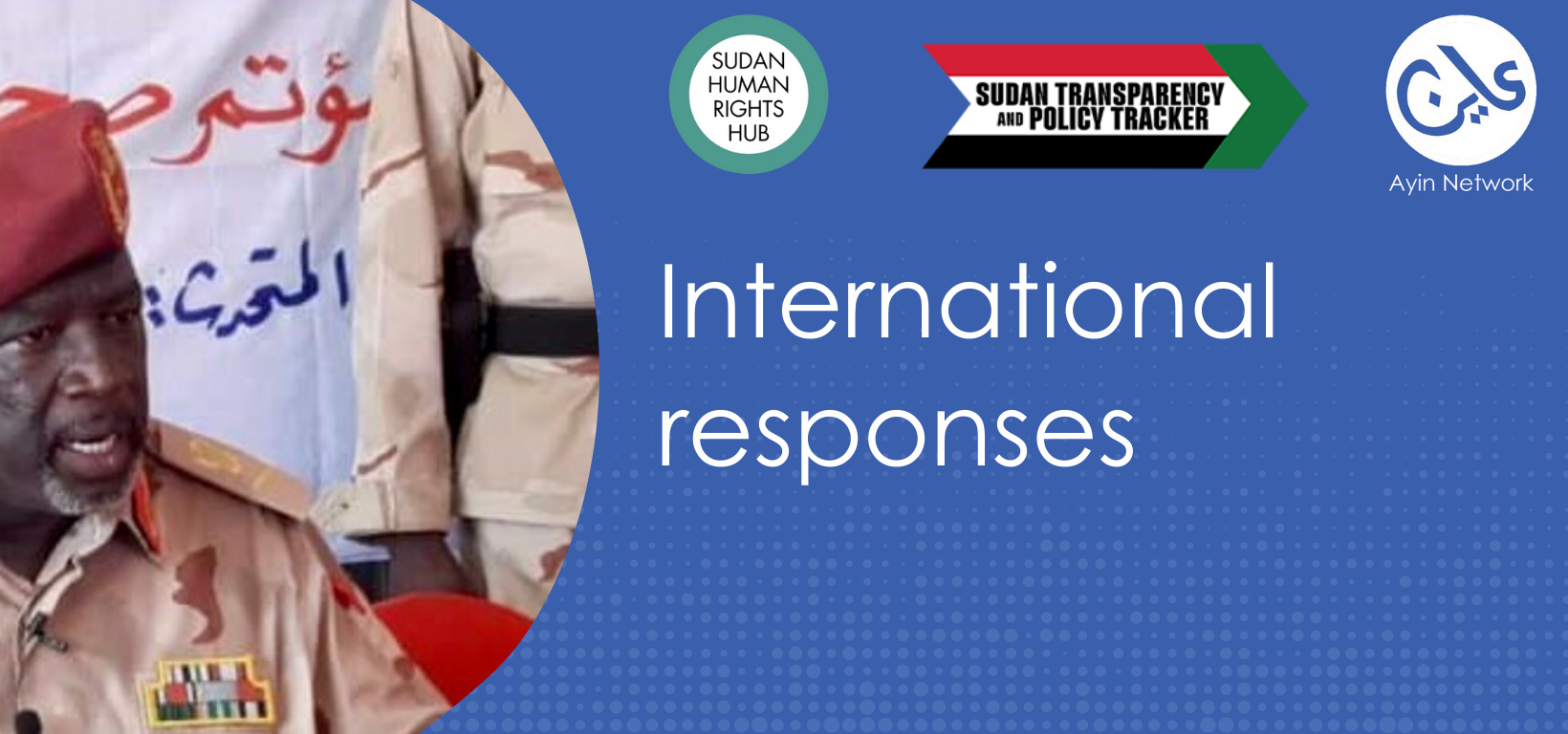
6. International response
Human Rights Council extends FFM mandate but UNSC deadlock
In October, the UN Human Rights Council voted to extend the mandate of the Fact-Finding Mission on Sudan. The mission’s first report highlighted a range of human rights violations as described in our previous monitor. Although there was concern that the mandate would not be renewed, states showed greater support than in the previous year. In particular, South Africa and Ghana voted in favour of the resolution. This allows the mission to continue its vital investigative and evidence preservation efforts.
The fact-finding mission recommended deployment of an independent force to protect civilians, application of the current Darfur arms embargo and ICC investigation to the whole of the country and for other justice mechanisms.
On October 21, the UN Security Council received the Secretary-General’s report on civilian protection. The report offered an analysis of the myriad threats to civilians, similar to those outlined by the fact-finding mission. The Secretary-General called for a renewed diplomatic push for a ceasefire and reinforced support for monitoring and reporting on human rights violations, but concluded that despite the gravity of challenges to civilian protection, the conditions were not right for the deployment of a UN protection force.
In response to the SG’s report, the United Kingdom and Sierra Leone drafted a resolution which, although it did not call for a peacekeeping mission, called on the parties to uphold their previous commitments under the Jeddah Declaration and protect civilians. The resolution further called on the Secretary-General to develop options for a compliance mission that would support monitoring of these commitments. Although relatively modest, the draft resolution was vetoed by the Russian Federation on November 18, reportedly on sovereignty grounds.
Amnesty International called the veto “shameful,” saying “once again, politics has stood in the way of civilian protection with the UNSC failing to fulfil its mandate.”
However, Russia’s role may be limited. The recent fall of Assad in Syria indicates that both Russia and Iran were too exhausted from war in Ukraine, Lebanon, and the Occupied Palestinian Territories to take action to protect him. This suggests Russia would not wish to expend any resources to support the SAF.
US and EU impose additional sanctions
The United States government imposed sanctions on Mirghani Idris Suleiman (Idris), who, as Director General of the U.S.-designated Defence Industries System, has functioned as a key leader of SAF’s weapon procurement efforts. As the last round of sanctions focused on RSF personnel, this may be an effort by the US to show that they are balanced in their approach.
In December, the EU imposed a new round of sanctions on both RSF and SAF leaders. Those targeted by the EU include former head of military intelligence, Salah Gosh, RSF operations chief Osman ‘Operations’ Hamid, West Darfur governor Tijani Karshoum, and Mohamed Ali, head of SAF military intelligence.



